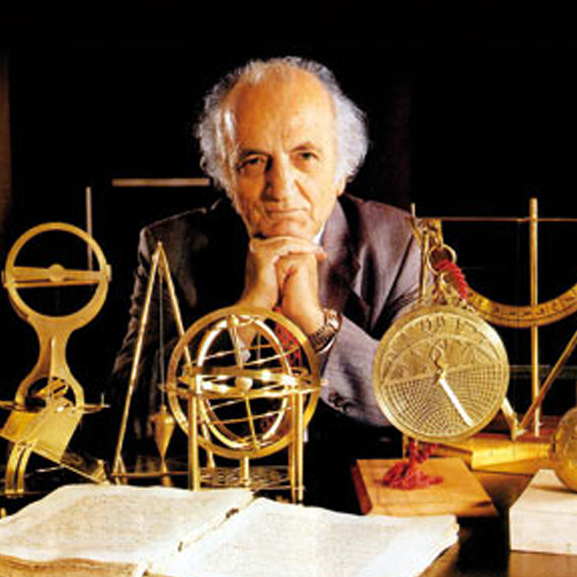Remembering Prof. Dr. Fuat Sezgin who listed scientific contributions of Muslim scholars

By Mukhtar Ahmad
Fuat Sezgin, founder of Historical Arab-Islamic Institute of Science at Johann Wolfgang Goethe University Frankfurt, Germany died in Istanbul on June 30 ,2018 at the age of 94 years. He devoted a considerable amount of time to studying and listing scientific contributions made by Muslim/Arabic scholars throughout history.
He was professor emeritus of the History of Natural Science at Johann Wolfgang Goethe University. Prof. Dr.Fuat Sezgin, a prominent historian of science in the world and leading figure of scholarship in Islamic science and civilization was born in Bitlis in eastern Turkey on October 24, 1924. He graduated from the faculty of literature at Istanbul University in 1947.
Sezgin came in contact with Helmutt Ritter a renowned 20th century German scholar of oriental studies who used to teach courses on Islamic sciences and orientalism at İstanbul University. when he was a student there. During one of Ritter’s lectures Sezgin wanted to know if there were any great Muslim mathematicians in the past. To his great surprise, he was told by Ritter that there were as many great mathematicians in the Islamic world as in Greece and in Europe. Ritter urged him to read the works of Al-Khwarizmi, Ibn Yunus and Ibn al-Haytham in order to broaden his knowledge of mathematics.
From that day on, he decided to learn about the contributions of the Islamic world to science and to make a contribution to science himself . By his intensive research work Dr Sezgin had made orientalists to acknowledge that Muslims have invented, discovered and developed a host of sciences like medicine, astrology, geography, chemistry, physics and other sciences. He proved that Muslims were inventors of many a thing.
During his years as a student, Sezgin also read Carl Brockelmann's five-volume “History of Arab Literature,” which was written based on manuscripts in Europe and İstanbul.. he found that most of the written Islamic sources were not included in Brockelmann's work, Sezgin decided to complete his work, , which required reading large number of books something that would last for decades.
However, Sezgin was not the only person who wanted to complete Brockelmann’s work, A group of European scholars made a similar attempt in the 1950s under the leadership of the Brill Publishing House, which published German translations of Arabic works. This group of scholars was able to complete Brockelman's work thanks to financial support from UNESCO. In 1947, Dr Sezgin had planned more addition in the book.
However, considering the huge task of this project, he confined the work up to 430 H. He published the first volume of this great work Geschichte des arabischen Schrifttums (The history of Arabic and Islamic heritage) in 1967. Until his death, Sezgin published 16 other volumes. He spent 40 years collecting material for the book, which is recognized as the finest and most thoroughly documented work of its kind. When he was writing the 18th volume, he died.
In 1947, after Sezgin finished his thesis about the development of the science of al-Badii,under the supervision of Hellmut Ritter, he prepared a second thesis regarding the philological exegesis in Abu Ubayda Ma’mar ibn al-Musanna’s Majaz al-Qur’an. While Fuat Sezgin was working on the Majaz al-Qur’an for his doctoral thesis, he noticed that some places in Majaz al-Qur’an were also found in the hadith book by al-Bukhari. The assertion by Sezgin that Bukhari used written sources refuted the earlier claims of the previous academics regarding hadith scholars just using oral traditions. Fuat Sezgin published in 1956 his dissertation titled ‘‘Studies in the Written Sources of al-Bukhari’’.
Sezgin was at the same time a pioneer in establishing institutions that carried the scholarly knowledge to the world public at large. First he founded the Institute for the History of the Arab-Islamic Sciences, in 1982, under Goethe University in Frankfurt and developed into a most significant centre for studies in the field. In 1983 he founded the Museum attached to the same Institute, where around 800 objects are displayed, containing, among others, replicas of instruments created and/or used by scientists for observations, experiments, measurements and calculations. Of great importance is the Museum for the History of Science and Technology in Islam which was established under his direction in Istanbul in 2008.
The Museum was inaugurated by H.E. Recep Tayyip Erdoğan, then Prime Minister of Turkey, on 25 May 2008. In 2010, he led the establishment of Prof. Dr. Fuat Sezgin Research Foundation for the History of Science in Islam to support the activities of this Museum.
In 2013, he also founded the History of Science in Islam Institute at Fatih Sultan Mehmet Vakif University in Istanbul. and the Prof. Dr. Fuat Sezgin Institute for the History of Science in Islam affiliated to the same university. Sezgin received outstanding awards, among them the King Faisal Prize for Islamic Sciences (1978) and the Turkish Presidency’s Grand Prize for Culture and Arts (2013).
